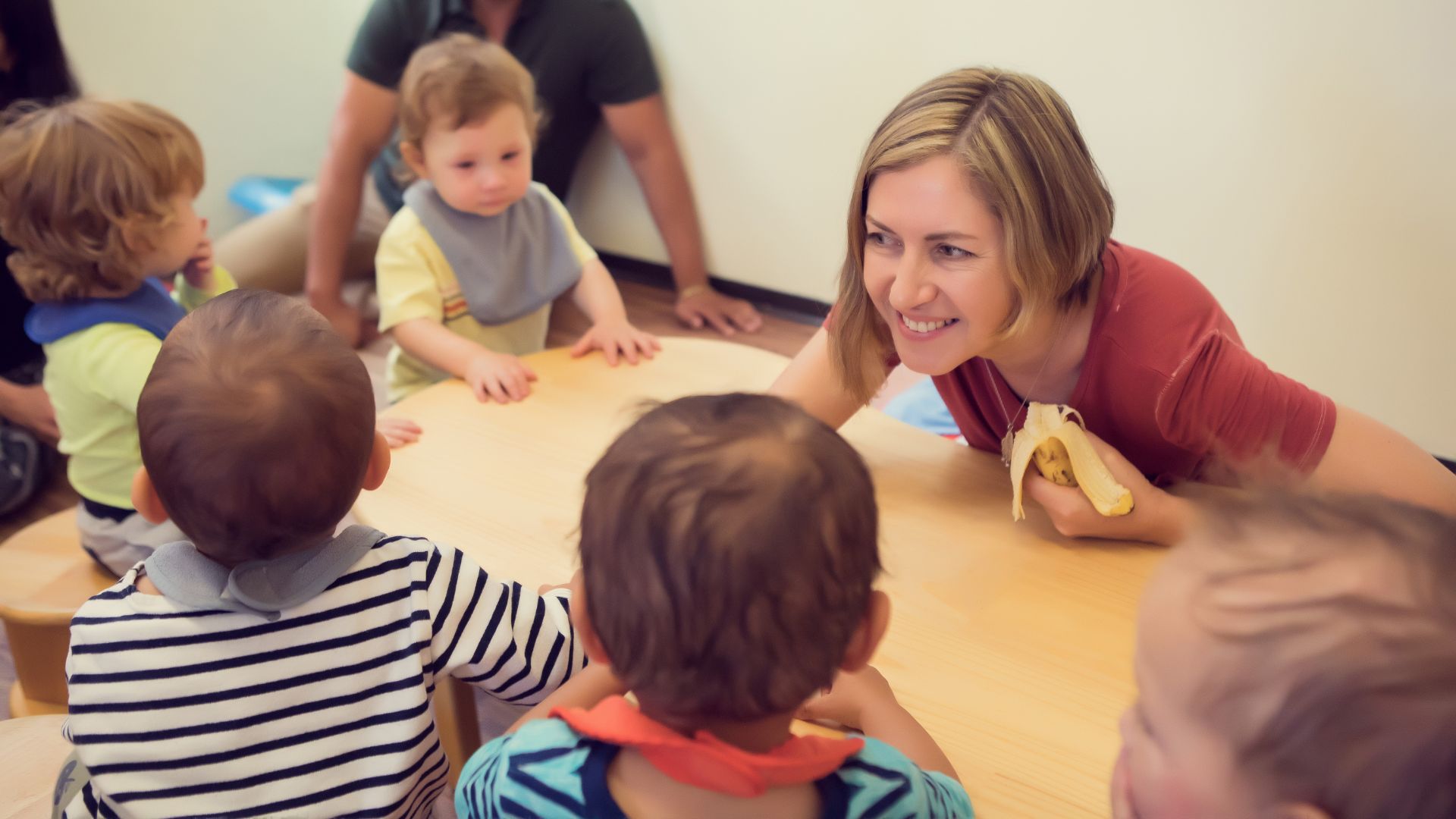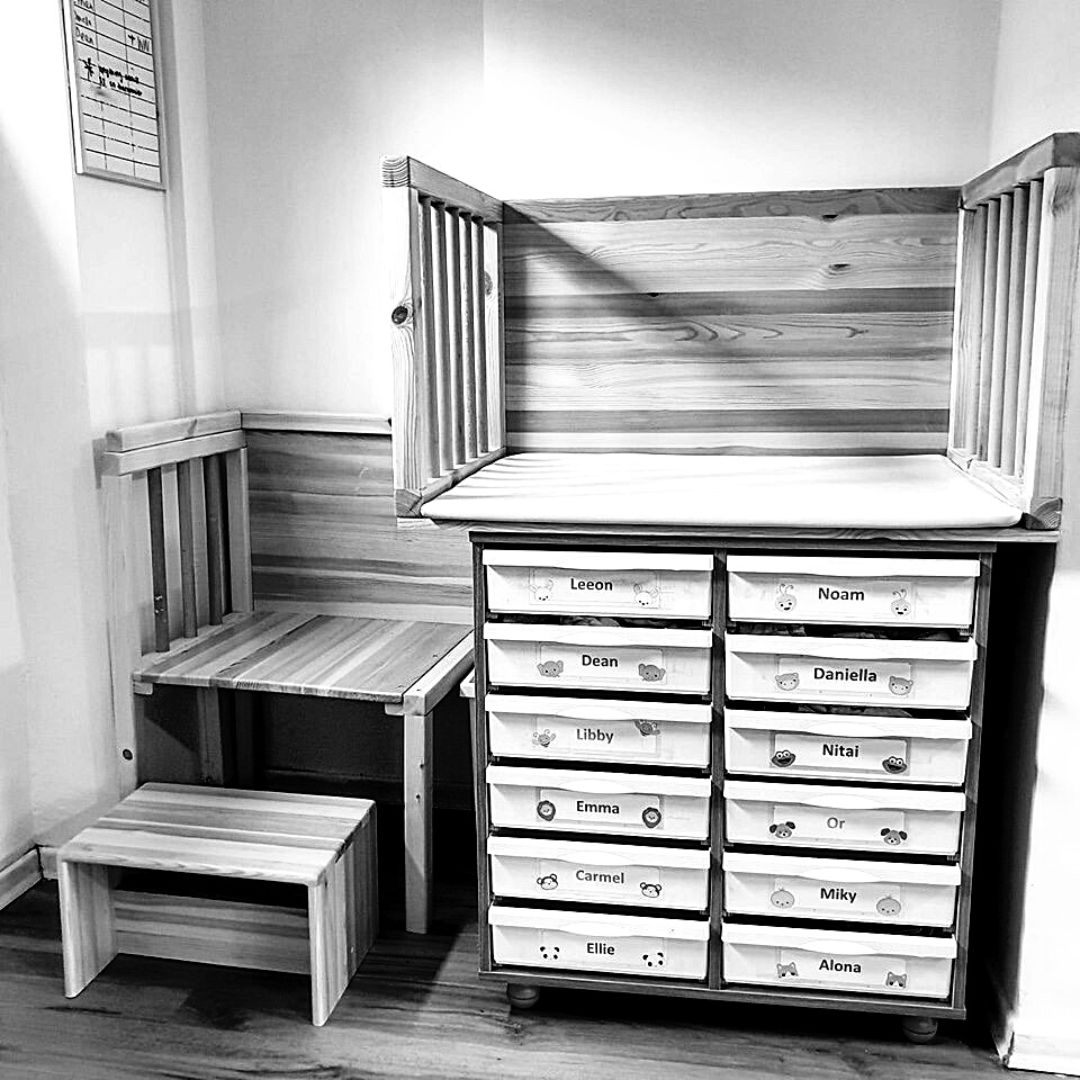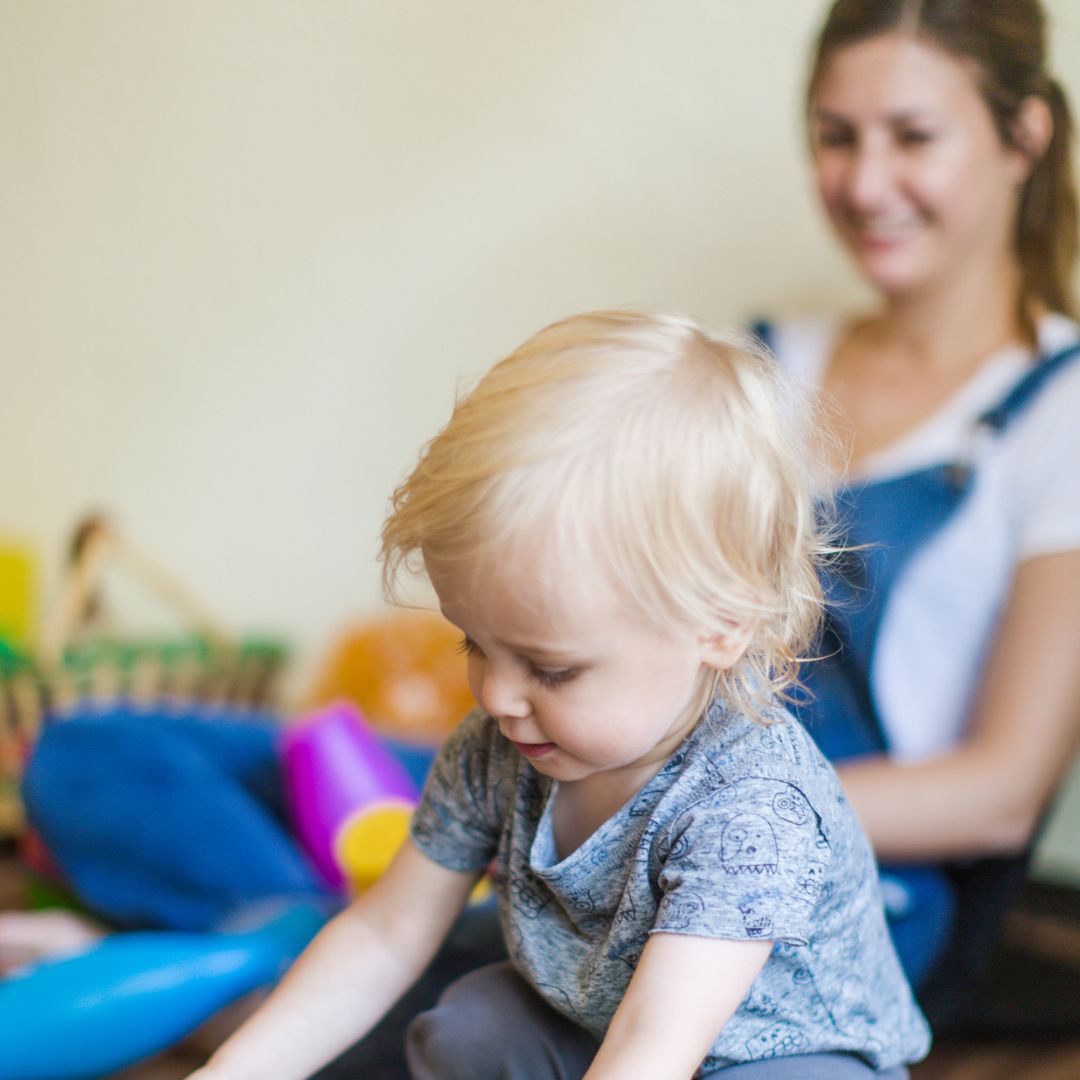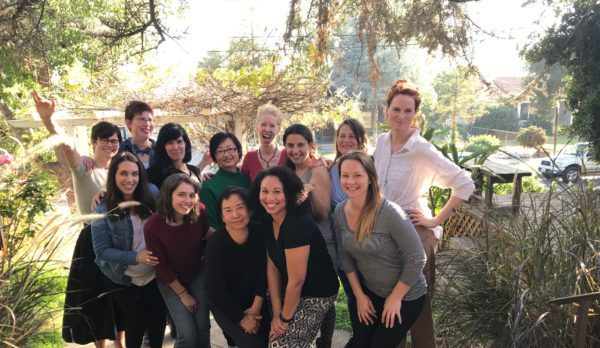See Infants With “New Eyes”
Magda Gerber asks everyone who works with children to see infants with new eyes, to set aside our preconceptions and see children for who they truly are, what they can actually do, and how they really feel. Educaring is an approach based on seeing and respecting a child’s process, individuality, and internal worlds, but it is not just that. You can’t learn how to invite a child to be cooperative during a diaper change from a class. Professionals who learn this approach will find a wealth of practical, day-to-day techniques that make caring for babies less burdensome and more joyful.
I would like to make the people who work with infants the most honorable and best paid–not overpaid, because it shouldn’t be done by people who do it only for the money. Educaring should be done by very capable people who also make a decent living. That’s what I would wish for the future.
We can make it happen. It won’t happen in weeks or even in months. The politicians will not make it happen. We have to do it. We have to present ourselves like professional people who do a most important job, which we do. Slowly, not in my time but in yours, this may have results. Keep fighting for it.
Educaring in Your Childcare Setting
The majority of children in the United States are cared for in family childcare. Providing childcare for infants and toddlers in your home can be a rewarding experience. Not only are you helping families take care of their most precious child, you are supporting your local community and economy. The responsibilities are many!
Although quality care for young children is clearly an essential need in todays’ world we have much to learn about valuing those who provide this care. Too often dismissed as, “just child care, only Family Day care, or even, “babysitting,” the importance and value of this work, and the people involved in carrying it out, must not continue to be overlooked.
We as providers can help to change this image when we seek and acquire the support and training available through RIE®. Through this work we can further develop our own personal skill sets while building professional confidence in ourselves as well as coming to a better personal understanding of the importance of the job we undertake daily. Working together in this way we are creating a community of learners and practitioners with worldwide influence and strength through our growing numbers, common philosophies, and shared resources, for further growth.
One simple principle stressed at RIE demonstrates this. It highlights the wisdom of understanding the value of time spent involved in the personal, daily, physical care of infants and young children. Typically, these tasks have been viewed by adults as an interruption to our program day rather than an opportunity for growth, learning and the development of solid, intimate, and reciprocal relationships.
Diaper changes are too often managed as quickly as possible, “Grab em up”, “hold em”, “lay em down”, and “tie a fresh diaper on”, as quickly as possible, and then, back to the important things. What a different view RIE brings to light when we spotlight the relationship, slowing down, paying attention to the voice shared through our hands and bodies as we meet and create a shared time together dedicated to this task.
The importance of each diaper change, the value of each one- on-one moment spent respectfully in care activities valuing the competency of the child each step of the way provides us with a new approach to a common task. This is just one simple, yet extremely subtle, powerful, and thought provoking, example of many learned through RIE. This work may change us both internally, through the development of our beliefs and a deeper understanding of our work, as well as externally, through our hands and actions, as we pass these teachings on to the children and families we work with day after day.
Resources for Infant Educarers, RIE, has been developed over decades and is based on both research and practice. It offers many insights similar to the one above to support us as we build our own developing professionalism and self respect through the daily care we provide to children around the world. These empowering principles and theories make it clear we are professionals in an essential workforce, so much more than a “babysitter”, we are shapers of lives, and of the future.
— RIE Associate Linda Hinrichs
Nannies are unique. They have one of the most important jobs in the world, to help raise children, and they do so in a family setting without actually being family. Their work is a perpetual blend of intuition and education…of intense intimacy and professional distance…of heart and mind.
RIE teaches us how to listen to and respect both of these forces. Through a unique process of education, observation, and reflection, we give nannies practical tools to become better caregivers.
Nannies come to RIE for many different reasons. This is a competitive and at times exploitative field, so having a professional development course listed on a nanny’s resume can bring important, tangible benefits to their career. Some nannies are enrolled in our courses by the families they work for, so that the whole caregiving team will have a shared understanding of how the child will be cared for. That said, most nannies who are interested in RIE come because they are passionate about providing the best possible care for the infants and toddlers they nurture—and if they don’t already have this powerful drive to care for infants with respect before they hear about RIE, they find it here.
“My eyes were opened to many techniques that will allow me to feel more confident and relaxed in my career, so that I can take better care of myself, my Nanny Kids, and their families!”
— RIE Associate Christina Vlinder
Child care providers play a critical role in a growing family’s life; partnering with parents to provide the very best possible care for their infants and toddlers when they are at work.
A caregiver trained in the RIE Approach is well-suited to support developmentally-appropriate, high-quality, infant/toddler care in a group setting. RIE’s practices aim to personalize the care for each child/family and create a warm, enriching and responsive environment. RIE’s research and relationship-based approach supports infant/toddler’s learning in all areas: physically, cognitively, socially and emotionally.
RIE recognizes that parents are their child’s first teacher and encourages caregivers to meet families where they are and, through intentional connection and communication, build a culturally responsive relationship to support the unique needs of each family. These responsive, respectful partnerships with parents help their infant/toddler foster attachment to both, providing continuity, stability, and predictability in the life of the young child.
RIE values building a trusting relationship with a consistent caregiver who through observation, follows the child’s cues and understands their needs. Primary care is encouraged in order for the provider to be a stable presence in the infant’s life. The provider is also more easily able to understand a non-verbal baby’s cues, in order to offer security, strength, and trust; giving the child freedom to explore and discover independently.
RIE’s principles are harmonious with best practices in child care. Magda Gerber, founder of RIE, is quoted as saying, “Appropriate curriculum for infants should not be a special teaching plan added to their daily activities, but rather it should be incorporated into the infants’ every experience.”
These relationship based experiences bloom naturally through one-on-one time when feeding, diapering and dressing a child. Active participation naturally encourages rich language through experiences that directly relate to the child while fostering creative thinking, problem solving, and independence.
Choosing the RIE Approach allows caregivers to enjoy their role, spend more time one-on-one observing and interacting with the children; leaving both the child and provider feeling refueled and connected. The role of a child care provider is a challenging one but, RIE’s unique approach can enrich the experience for all involved.
— RIE Associate Carolyn Paetzel
Many wonder if RIE can work in all circumstances, for children and families with varying needs and in all types of programs. Oftentimes when working in group care, especially those in subsidized programs that have to answer to federal or state regulatory agencies, it can feel impossible to offer the basic tenets of the Educaring Approach.
Questions come up about how to provide freedom of movement and allow for natural gross motor development when the screening tools and developmental assessments require certain milestones to be identified, for example. How then can a teacher or administrator focus on what the child is doing without being in a rush to get to the requirements on the checklist?
One way to achieve this is through dialogue, policy-change and advocacy. Licensing entities are often open to hearing how the objectives and goals are being met in ways that aren’t on the checklist if the justification is documented and visible. Magda reminded us, “If you can change one thing you will have made a difference. Then you can change another and another. It will take your whole life. Are you ready for this?” Starting with changing one thing, arguing for best practices within the constraints of regulated programs, can make a difference.
Remembering the way that Magda modeled meeting each person where they are can help make this impossible task feel possible. In RIE’s 40th anniversary celebration video, Renata Cooper, a leader in the early education field and a long-time proponent of Magda’s work, alluded to the thought that RIE can work in every setting, culture and program because it is a theoretical framework that everyone who interacts with a child can access. It is this critical framework that supports humans at every stage by inviting the essential perspectives needed to provide high quality, respectful, individualized care for all children and families.
— RIE Associate Melissa Coyne
When a family is lucky enough to be supported by a Postpartum Doula with knowledge of RIE, they are not only getting emotional and physical support, but also evidence-based education in the 0-3 month period.
With their focus on new moms and dads in the “4th trimester,” doulas provide vital support to parents in our increasingly disconnected world. With their one-on-one approach, doulas are great carers, modeling attentive care of the family and allowing the parent to focus on their baby. For the doula who is interested in supporting new parents with bonding and attachment, RIE can help you bring Bowlby and Ainsworth’s care-focused attachment picture and practice to support the family.
Doulas are also great listeners. Through their guidance and care, a postpartum doula can help new parents work through the many changes and questions that arise upon becoming a parent. With knowledge of the Educaring Approach, doulas have a unique opportunity to help parents access their new identity as a parent in a truly authentic way.
While being a doula is not about teaching child-rearing, with RIE’s understanding of parents and babies, doulas can take their emotional support of the parent even deeper, helping new parents find their footing in this new role. We know that helping parents learn to observe their baby, communicate with and respond to their needs, and trust in their natural development can be among the most meaningful supports we can give a brand new parent.
— RIE Associate Ida Reid
Home visitors meet families where they are, entering the very center of the child’s world and being culturally responsive to the families they serve. Home visitors play a vital role by directly supporting the parent as the child’s first and most important teacher.
RIE is deeply aligned with key home visiting concepts. We believe parents are the experts on their own child. A foundational concept of RIE is that the routines and activities of everyday life provide sufficient opportunity and experience for infants/toddlers to learn and grow in a healthy way.
With our focus on observation, we help parents learn to recognize how their infants/toddlers are growing physically, emotionally and cognitively. Observation also forms the basis of our approach to engaging, connecting and establishing relationships with families.
With our capabilities approach to infant/toddler development, we help parents value the progress babies make every day toward development goals. Our relationship- and science-based approach promotes parenting knowledge, attitudes and practices that support optimal learning and development.
Concepts for Group Care
In addition to the principles of the Educaring Approach, we have several concepts we encourage in childcare settings:
- We believe babies and caregivers function best with individualized care. Read more on topic here
- Babies feel most secure when they receive continuity of care during the early years. Read more on topic here
- Caregiving is the curriculum for infants and toddlers. Read more on topic here
- We prioritize the relationship with the baby over the task to be accomplished. Read more on topic here








 Educaring® Practice: Tell the Baby What You are Going to Do
Educaring® Practice: Tell the Baby What You are Going to Do RIE® Foundations: Theory & Observation™
RIE® Foundations: Theory & Observation™